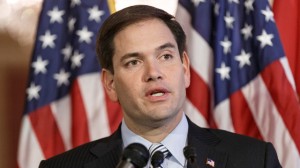On Tuesday, the 50th anniversary of the launch of President Lyndon Johnson’s “War on Poverty,” Sen. Marco Rubio (R-FL) gave a widely anticipated speech laying out his vision for breaking poverty’s grip on nearly 50 million Americans.
He started off strong. Rubio spoke of growing up in a poor family. He noted the fact that, “from 1980 to 2005, over 80% of the total increase in income went to the top 1% of American earners,” and pointed out that other countries’ economies produce more upward mobility than ours does today. He acknowledged that “our modern day economy has wiped out many of the low-skill jobs that once provided millions with a middle class living.” Echoing a recent speech by Barack Obama, he said “the erosion of equal opportunity is among the greatest threats to our exceptionalism as a nation.”
Yet it also featured a generous helping of conservative boilerplate about the wonders of the free enterprise system, the failures of big government and the supposed futility of raising the minimum wage. Confusing causation with correlation, Rubio made the common claim that the decline of traditional marriage has led to a significant increase in economic insecurity.
His prescriptions also offered some shopworn rhetoric, calling for less regulation, lower taxes and lamenting “the uncertainty created by a dangerous and growing national debt.”
But he offered two proposals that will likely define the Rubio anti-poverty agenda in the years leading up to 2016, when he is expected to seek the Republican presidential nomination.
First, Rubio would replace the Earned Income Tax Credit (EITC) – which supplements the incomes of the working poor, especially those who have kids — with a “federal wage enhancement.” Rubio said his enhancement would differ from the EITC in that single people would be eligible for the same kind of subsidies families with children enjoy today, and it would be added to workers’ paychecks instead of being paid out in a lump sum at tax time.
It’s difficult to evaluate how this idea might work in the real world absent significantly more detail. But it’s worth noting that the EITC is one of the most successful – and largest — social welfare programs we have: Census Bureau data show that in 2010 it lifted more than five million Americans out of poverty. And the EITC is structured in such a way that it disproportionately helps the very poor. If Rubio’s alternative isn’t, it could take dollars from the very poor and give it to those who earn a bit more.
Rubio’s other “big idea” would turn the entire social safety net over to the states, replacing a wide array of federal social welfare programs with “flexible” block grants. “Innovations are difficult to pursue because Washington controls the money,” he said. “But I know from my time in the Florida legislature that if states were given the flexibility, they would design and pursue innovative and effective ways to help those trapped in poverty.”
There are two serious problems with this idea. First, block grants increase with inflation, regardless of what’s happening in the larger economy. In the current system, social welfare spending increases during recessions, as more people become eligible for unemployment benefits, food stamps and the like. The “counter-cyclical” nature of these programs not only provides a vital lifeline to the neediest when they need it most, it’s also an important source of stimulus. When the economy takes a dive, these programs ramp up automatically, without the need for political battles.
Second, block grants would deepen the already significant divide between the red and blue states. When it comes to spending on health care, education and anti-poverty programs states have widely divergent priorities. These differences are ameliorated to a degree by the federal government’s involvement in our social welfare programs, assuring that every American has access to some minimal level of social services even if their states are run by the most conservative politicians.
Turning over the entire welfare state to local governments would risk making the cliché about “two Americas” a stark reality – people living in blue and red states would experience entirely different forms of government.
It’s also a solution in search of a problem. While Rubio lamented the lack of flexibility in these programs, the reality is that with very few exceptions, our social safety net programs are cooperative efforts between the states and Washington, and states have wide leeway in setting eligibility requirements, benefit levels and other aspects of their administration. What’s more, to address unique local needs, there are Community Development block grants, which have few strings attached and can be used for all sorts of programs.
Today, Marco Rubio unveiled his ideas as some new, outside-the-box thinking about how to address poverty. They are anything but. For one, the GOP budget authored by Rep. Paul Ryan (R-WI) would also convert major chunks of our social welfare system to block grants.
And way back in 1975, during the Republican primaries, Ronald Reagan called for the “systematic transfer of authority and resources to the states — a program of creative federalism for America’s third century.”



